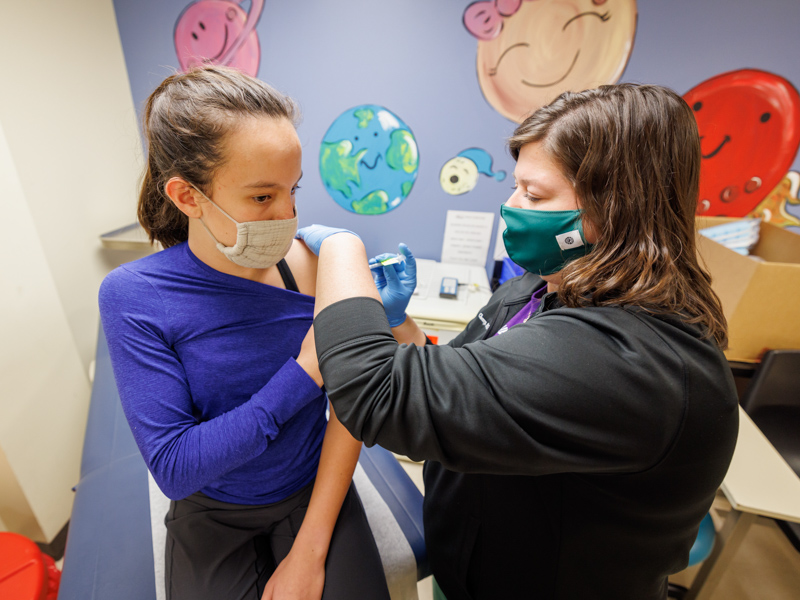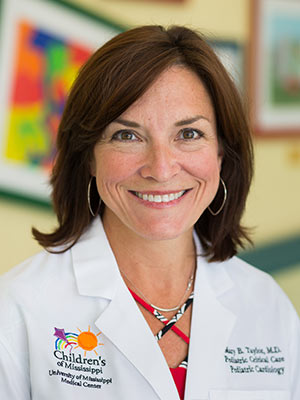Majority of children hospitalized with COVID-19 are unvaccinated

The latest surge of COVID-19 has produced a jump in hospitalized patients at Children’s of Mississippi, mainly in Mississippi’s youngsters without the added protection of vaccination.

"Most of our children admitted specifically for COVID-19 are unvaccinated or are younger than 5 years old and don’t qualify for vaccination,” said Dr. April Palmer, professor and chief of pediatric infectious diseases at UMMC.
Kehle Hutto was getting the protection of a second dose of the Pfizer-BioNTech vaccine Friday afternoon at Children’s of Mississippi’s Batson Kids Clinic.
“It wasn’t bad,” said the 12-year-old from Madison. “It didn’t even hurt, and my first shot didn’t, either.”

The vaccination makes becoming ill or hospitalized less likely, said Dr. Mary Taylor, Suzan B. Thames Chair and professor of pediatrics.
“In the past two weeks, the number of children hospitalized at Children’s of Mississippi because of COVID-19 has tripled,” Taylor said. “We know the importance of in-person learning for children and want schools to be open safely. We encourage parents to have their children wear face masks when in school or in public and to get their children vaccinated against COVID-19.”
Just before Thanksgiving, there were few pediatric COVID-19 cases at Children of Mississippi, the state’s only children’s hospital. Today, 20 children diagnosed with COVID-19 were hospitalized, including three in intensive care.
Some pediatric COVID-19 cases are less severe, but other children require advanced care including ventilation, said Gordon Gartrell, nurse manager for the pediatric intensive care unit inside the Kathy and Joe Sanderson Tower at Children’s of Mississippi.

“Children with chronic conditions and comorbities tend not to fare as well,” he said, “but all children, adolescents, and young adults are at risk. And MIS-C is still seen in the PICU as a serious complication of the coronavirus.”
In MIS-C, or Multisystem Inflammatory Syndrome in Children, the immune system of a child who has been infected with SARS-CoV-2, the virus that causes COVID-19, begins to attack the body’s healthy cells, including blood vessels, the heart and other organs.
The U.S. Centers for Disease Control and Prevention expanded the emergency use authorization for Pfizer's Covid-19 vaccine boosters to children ages 12 to 15 and shortened the time between the second vaccine dose and booster from six months to five months for those 12 and older.
The Pfizer-BioNTech vaccine has been available to children ages 5 to 11 since November 2021, when the U.S. Centers for Disease Control and Prevention approved an emergency use authorization for a smaller dose for this age group. Previously, the vaccine was available to ages 12 to 15 through an emergency use authorization in May.

“Vaccinations have been proven to be safe and effective in reducing the risk of contracting COVID-19 and making any breakthrough infections less severe,” said Dr. Charlotte Hobbs, professor of pediatric infectious diseases. “It’s important to protect children from becoming infected by the SARS-CoV-2 virus since we have fewer monoclonal antibodies options since some of them are not effective against the Omicron variant.”
As children return to in-person learning after the holiday season, taking precautions is essential, said Gartrell.
“As always, masking up, appropriate hand hygiene and social distancing when at all possible are key to limiting the spread of this highly communicable disease,” he said.
Children who are feverish or exhibiting any other symptoms of COVID-19 should stay home from school to reduce the virus’ spread, Palmer added.
“At the end of the day, we can do more to protect our kids,” Gartrell said. “The more we vaccinate both adults and children, the less likely it is to have children who need to be hospitalized due to COVID-19.”


